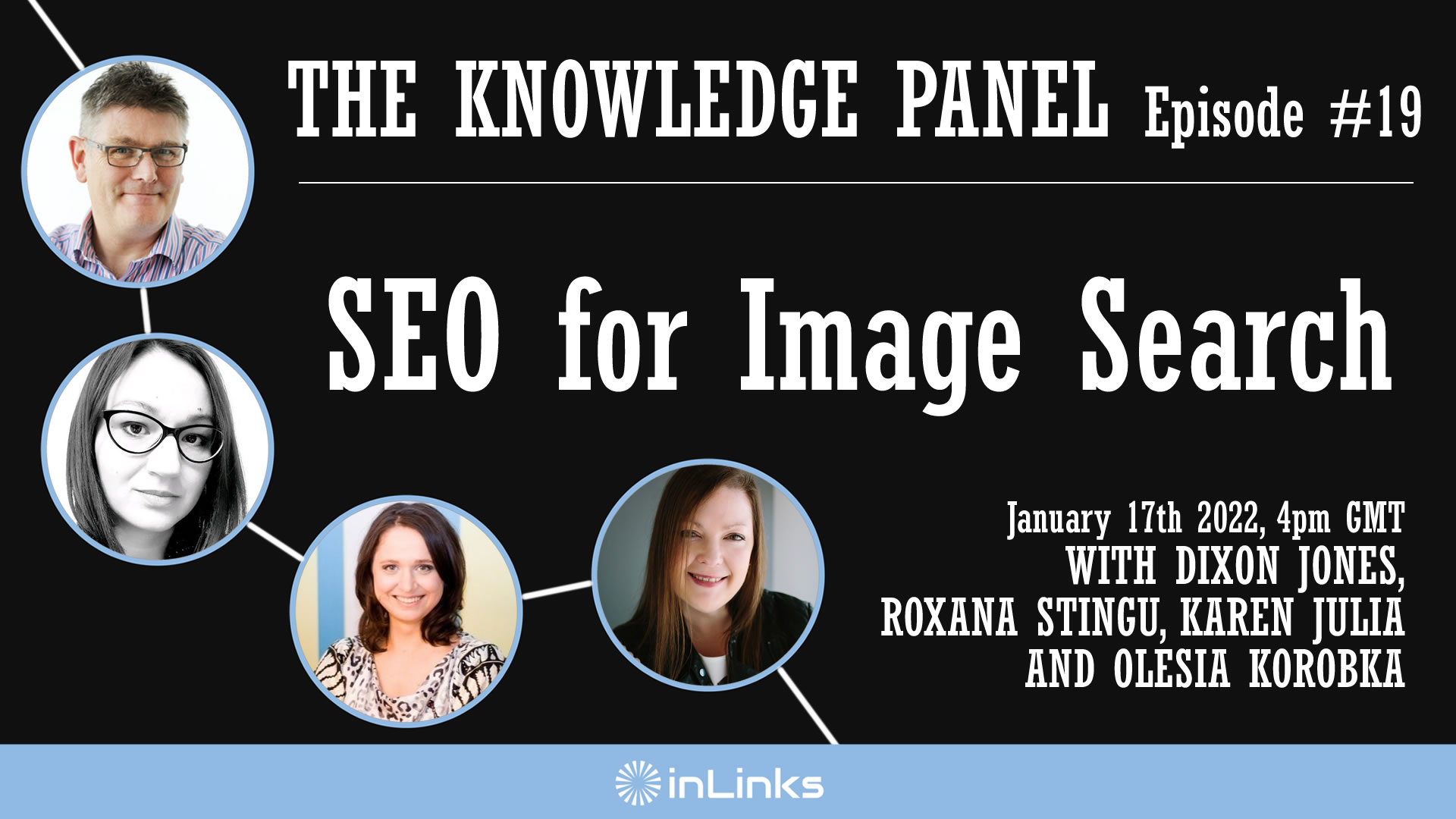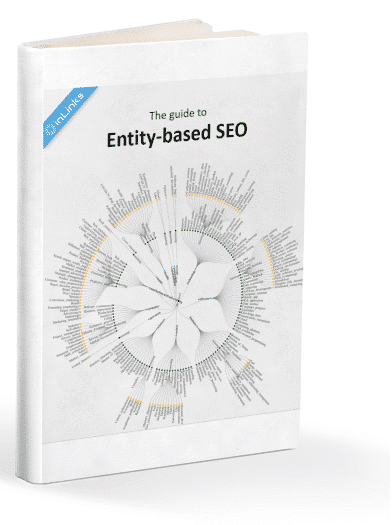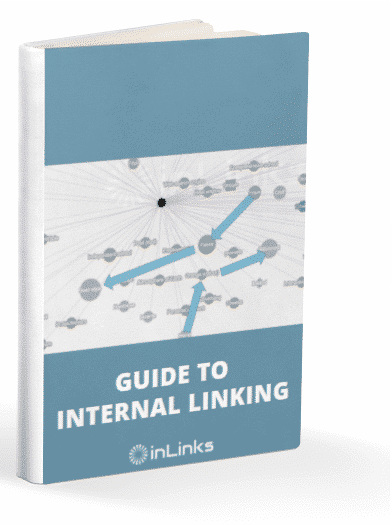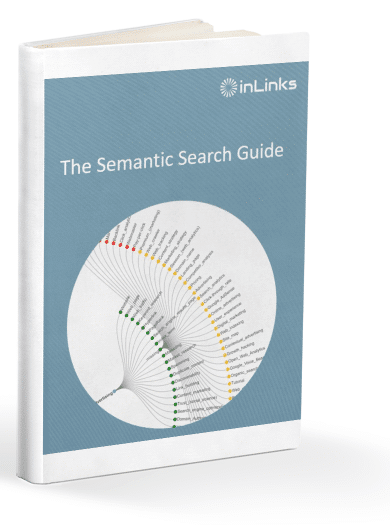Are you optimizing your images for search? How much traffic are you getting from image search and how big is image search as an SEO opportunity?
We’ll be covering those questions and more in episode 19 of the Knowledge Panel Show with Roxana Stingu from Alamy, Olesia Korobka from Fajela and Karen Julia from Photo SEO Lab.

Sign up below to watch future episodes live…
Want to Read Instead? Here is a Summary
Welcome to another episode of the Knowledge Panel! In this episode (Episode 19), our panel of SEO experts delves into the intricacies of optimizing images for search engines. Our guest experts include Alicia, an SEO entrepreneur from Kiev, Ukraine; Karen, a wedding photographer specializing in SEO strategies; and Roxanna Singhu, Head of SEO in Search at Alamy, a stock photography website.
Let’s jump into the discussion!
Introduction and Panelists
Host: Hello, everyone, and welcome to Episode 19 of the Knowledge Panel. Today’s topic is SEO for image search. We have a brilliant panel of experts here to share their insights.
Alicia: Greetings, everyone! I’m Alicia, an SEO entrepreneur from Kiev, Ukraine. I specialize in technical aspects, including image optimization. Images can significantly impact your rankings when used correctly.
Karen: Hi, I’m Karen, a wedding photographer with a focus on SEO. I work with other photographers to optimize their websites for image-heavy content.
Roxanna: Hello, I’m Roxanna Singhu, Head of SEO at Alamy, a stock photography website. I’ve worked with Google on various image search initiatives and am based near London.
Key Takeaways
Host: Before we delve into the details, if our audience doesn’t have time for the entire episode, can each of you provide a key tip for optimizing images for search?
Karen: Building context around images by integrating relevant text nearby is crucial. This enhances the user experience and helps with search visibility.
Roxanna: Utilize responsive image coding, like the picture element, to deliver different image sizes based on user devices. This boosts both speed and search engine preference.
Alicia: Treat images as important content and embed them within text. Translate images into meaningful text content to improve ranking outcomes.
Benefits of Image Optimization
Host: Moving on to our main topic—why should businesses invest time in optimizing images for search? How does this translate into tangible benefits?
Karen: Images in search results can offer visual reinforcement for users considering a product or service. Contextual text around images enhances user engagement.
Alicia: Optimized images can positively influence search rankings. They also provide opportunities for ranking in Google’s image search, which can drive organic traffic to your site.
Roxanna: A Google survey found that 50% of online shoppers utilize images in their purchasing journey. Optimized images increase your chances of being discovered by potential customers.
Metadata and Copyright Protection
Host: Alicia mentioned the importance of metadata and copyright protection. How can businesses ensure their images are properly protected and attributed?
Karen: Adding copyright information to image metadata is essential. Adobe Lightroom and other tools can help bulk-edit metadata, including copyright details.
Roxanna: Google Lens and reverse image search now emphasize image licensing and attribution. Utilize metadata or structured data to provide accurate ownership information.
CDN Hosting and Copyright
Host: Does hosting images on a Content Delivery Network (CDN) pose any copyright challenges, and how can businesses address this?
Roxanna: Hosting images on a CDN doesn’t necessarily affect copyright. Structured data and metadata will still reflect the copyright holder’s information, even if the image is on a CDN.
Schema Markup for Images
Host: Roxanna mentioned structured data and schema markup for images. How can businesses implement this effectively?
Alicia: Schema markup helps search engines understand your content better. For image-rich websites, structured data can provide details like licensing, copyright, and image context.
Karen: Schema markup is particularly useful for e-commerce businesses. It helps showcase products and their attributes in search results, enticing potential buyers.
Images play a crucial role in enhancing the visual appeal of websites and improving user experience. However, their impact on SEO often goes overlooked. In this insightful discussion, three experts – Alicia Korobka, Roxana Stingu, and Karen Sorensen – delve into the intricacies of image optimization for search engines. The conversation covers various aspects, from image formats and site maps to geotagging and user experience.
The Importance of Image Optimization
The discussion kicks off by highlighting the significance of optimizing images for SEO. The experts agree that images aren’t just decorative elements; they can significantly impact website rankings and user engagement. Alicia emphasizes that images should be optimized not only for search engines but also for user accessibility.
Strategies for Image Optimization
The experts delve into various strategies for optimizing images effectively. They discuss the relevance of alt text, which is essential for screen readers and search engines to understand image content. They stress that alt text should be unique, descriptive, and integrated into the overall content seamlessly.
Karen shares her perspective on using stock photos and dispels the myth that they can negatively affect SEO. She points out that the context in which images are used matters more than whether they are unique. Google prioritizes user experience, and if the image is appropriately integrated into the content, it can enhance rankings.
Image Formats: WebP and More
The conversation shifts to image formats, with a focus on WebP. While WebP is praised for its performance benefits, the experts note that its adoption isn’t universal due to browser compatibility issues. Roxana suggests considering WebP as an option for image-heavy sites, provided users’ browser compatibility aligns with the format.
Image Sitemaps and Geotagging
Image sitemaps and geotagging are discussed in detail. Karen emphasizes the importance of not indexing image sitemaps for websites with numerous images and pages with little contextual content. On the other hand, geotagging, the process of adding geographical metadata to images, is highlighted as a valuable strategy, especially for local businesses looking to improve their relevance in specific regions.
WordPress and Plugins
The panelists share their thoughts on WordPress and plugins for image optimization. While plugins can help, they caution against over-relying on them, as improper settings can lead to issues like slow performance or invisible images. They advocate for manually optimizing images before uploading them to WordPress, ensuring proper integration with the content.
Upcoming Knowledge Panel Episode
The next episode of the Knowledge Panel will focus on user experience’s impact on SEO. Join the conversation on February 21st, 3 p.m. to 4 p.m. GMT. Sign up at www.knowledgepanelshow.com to receive alerts when the episode goes live.
The conversation concludes, leaving the audience with a wealth of valuable insights into optimizing images for SEO. Image optimization is not just about improving search rankings; it’s a critical aspect of enhancing user experience and creating a more engaging website.
Concluding Thoughts
Host: That’s a wrap for today’s episode! We’ve explored the world of image search optimization, from metadata to copyright and schema markup. Our experts have shared valuable insights to help your images shine in search results.
Remember, optimizing images isn’t just about improving aesthetics—it’s about enhancing user experience, ranking potential, and driving organic traffic. Thank you for joining us for Episode 19 of the Knowledge Panel!
[Note: For more information, refer to the original transcript or accompanying resources provided by the panelists.]
Expert Contact Information
Alicia Korobka: Connect on Twitter, Facebook, and Google – @olesiakorobka
Roxana Stingu: Reach out on Women in Tech SEO Slack or find on LinkedIn and Twitter – @roxannastingu
Karen Sorensen: Visit the Photo SEO Lab website – www.photoseolab.com and find on Twitter – @PhotoSEOLab




Leave a Reply
Want to join the discussion?Feel free to contribute!